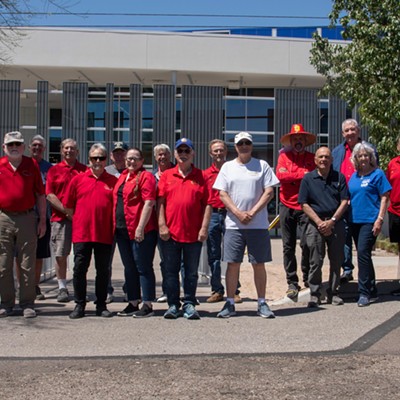Cholla High School teacher Corey Jones was escorted out of his classroom a few minutes before representatives with the Arizona Department of Education showed up to observe his U.S. history from a Mexican-American perspective class on Friday, Feb. 6.
By noon that day, Jones was asked to give up his school keys and identification, and told he wasn't allowed in any Tucson Unified School District property or have any contact with staff or students.
That morning event was about one month after former state schools superintendent John Huppenthal singled out Jones' course in a Jan. 2 notice of noncompliance, as one of a handful in the district found to possibly be in violation of the state's anti-Mexican-American studies law.
During the weeks leading to that, Jones says the district had been enforcing significant changes to the culturally relevant curriculum (unknown to those outside the TUSD-ADE tunnel). Censorship weighed heavy and the "we will stand by our teachers" sentiment took a 180-degree turn.
According to Jones, students in his culturally relevant class were discontent with how things unraveled. The day ADE reps were supposed to sit in the classroom, they had planned a walkout to protest what they saw as unjust.
The plan reached the ears of school and district administrators, who immediately pointed fingers at Jones as the "mastermind" and decided to pull him out (a decision supported by Lorenzo Lopez, director of TUSD's culturally relevant pedagogy, according to Jones). "(They said) the students lacked the capacity or the will to organize on their own," he says. Students repeatedly said Jones hadn't influenced their plans.
Still, the district launched an investigation into his alleged involvement. It was later found he had nothing to do with it. (Jones wasn't allowed to speak to the media during that time. When the Tucson Weekly reached out to Cholla in early March for a follow-up to Jan. 15's "The Never-Ending Scrutiny," we were told he was unavailable.)
"I was proud of my students. The perception of youth, particularly youth of color was one of criminal apathy toward their education, and their actions served as evidence that ran counter to that," Jones says. "We are talking about $14 million and that is what is important. The district put that responsibility on the site administrators ... I was told by one site admin that they had professional aspirations beyond their current positions and they would not have the loss of $14 million attached to their name."
On March 3, in a joint press conference in Phoenix, TUSD Superintendent H.T. Sanchez and Superintendent of Public Instruction Diane Douglas announced the state had pardoned TUSD from losing 10 percent of monthly state aid. She said she was happy with the district's "progress," but that ADE would continue monitoring culturally relevant classes until the end of the school year.
Neither party concretely answered what it was the district had done to be found in compliance. Two months prior, Douglas assured she did not have an issue with the curriculum, but with how educators taught it in the classroom.
On Jan. 6, the evening before Sanchez and Douglas met for the first time, Sanchez called for a meeting with the culturally relevant curriculum teachers at Revolutionary Grounds on Fourth Avenue.
"(Sanchez claimed that) artists like Rage Against the Machine should be valued ... and not removed," he says, remembering a quick individual conversation he had with Sanchez before the meeting began. (Jones' course was flagged by the state over a Rage song). "We were told by Sanchez to not change a thing, to keep doing what works, that he got the sense Douglas' fight was with Common Core, not banning ethnic studies."
Jones says Sanchez promised the district and site administration would fully have the teachers' backs, reinforcing they had done nothing wrong.
"He was encouraged by the fact that he and the district had such committed and passionate teachers," Jones says. "A question came to Sanchez, 'How much support are we going to get from the district? Like $14 million-worth of support?' Sanchez responded with, 'We just so happen to have $14 million in reserves,' and that, although it would be hard to sell to the (governing) board, that he was committed to (the culturally relevant curriculum)."
Jones left with an "OK, we are going to fight this" mentality, although he still had reservations. But after Sanchez's lunch meeting with Douglas on Jan. 7, tables turned. He came back as a nominee for Douglas' Latino Advisory Committee, saying he didn't feel ADE wanted to shut down the culturally relevant program, but that they wanted to address concerns in a collaborative manner. "The law is the law," Sanchez said at a press conference that day.
(In an interview with the Tucson Weekly around that time, Sanchez reinforced his alleged support for the culturally relevant classes.)
Jones and other culturally relevant teachers wondered, what the hell happened between last evening and today?
Then the classroom visits and other ADE requirements began. Jones had to hand over two-week lesson plans. Administrative meetings with Jones over the analytical tools he chose to bring into the classroom—songs by artists like Common, Immortal Technique, Dead Prez, and Rage were a no-go—became a tradition.
In the culturally relevant curriculum, the teachings of Paulo Freire's "Pedagogy of the Oppressed," Rodolfo Acuña's "Occupied America," and Howard Zinn's "A People's History of the United States" moved down the reading list priorities, replaced at the top by a textbook the district brought in without discussion called "The American Vision" (published by McGraw-Hill Education), Jones says. The assessments went from critical thinking-based to multiple-choice exams "to appear more traditional."
One instance, Jones recalls showing the PBS documentary "Precious Knowledge," which touches on the movement to fight the ban of Mexican-American studies, in one of his non-culturally relevant courses. The school administration demanded he not show the rest of the film.
"Talking about education as a civil rights issue ... what is more benign than PBS?" he says. The site administrators told Jones the documentary wasn't on the culturally relevant curriculum. "It was a non-CR class, though," Jones replied. Even if it had been, up until that point, teachers were allowed to introduce age-appropriate material that complimented the content on the curriculum—material that didn't necessarily have to be listed on the latter.
"The justification that was given for it, 'It is just for the next 90 days,' everything, every single change ... once March 4 hits, it will go back to normal, you are going to have to eat shit, you are going to have to take it," he says. "We should be pushing, now it's the time. Very possibly, the (9th Circuit Court of Appeals) is going to rule this piece of legislation as unconstitutional. The damage you are doing to the curriculum, which is already a watered down, domesticated version of the (Mexican-American studies). CR served as the vaccine to the MAS virus—I started to question, at what point do we say enough?"
On the day Jones' students planned a walkout, he told administrators he would stand side-by-side with them. At that moment, they asked for his school stuff, and didn't allow him back into the classroom to pick up his personal belongings. It was surreal. Merely a couple of months before, in November, Jones' work with the students had received a great review from the school.
A few days out of the classroom turned into weeks and weeks turned into "we will pay you to stay home the rest of the school year." At first, returning to Cholla was a minor possibility, which then flipped to getting reassigned to another school, perhaps on the east side of town. That never happened.
Several other investigations were made, including one alleging Jones audio recorded his students, which also led to nothing.
Sanchez sent a short statement to the Tucson Weekly, "Mr. Jones has submitted his resignation effective May 22, 2015, through a signed separation agreement. If Mr. Jones had not signed a separation agreement, the district would have proceeded with a non-renewal of his contract for next year. At this time, the district cannot comment on anything Mr. Jones may have stated."
As that date approaches, Jones has been exploring his options.
He's left to wonder what the district told ADE reps when they showed up with plans to sit through his second period class, and it never happened. Jones had vanished
"It was naïve for me to believe that theoretical commitment would continue through their actions, I do take responsibility for that, I have been in this profession long enough, and I have seen the hypocrisy between rhetoric and action many, many times," he says. "I have served the purpose that they wanted me to serve. They made their deal with ADE, made significant changes to the curriculum...and they want me to go away as quickly as possible."
Watch the video below to see Sanchez discuss the Mexican American Studies program at a press conference in March. He answers question from Tucson Weekly around the 6:30 mark.










